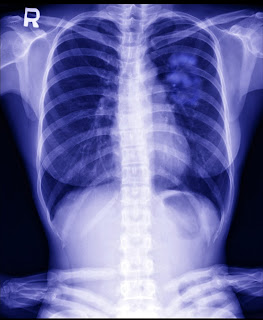Short-listed for Access to Understanding 2013
Edinburgh and King’s College London have discovered a one-protein switch that makes
normal lung cells behave like metastatic cancer cells. This exciting finding,
published in PLOS One in July 2012, brings us closer to conquering lung cancer.
mortality rates. It kills more people than any other cancer in the Western
World, including the
Small cell lung cancer (SCLC) is an extremely aggressive form of the disease
that grows quickly and spreads rapidly to other parts of the body, creating new
tumours called metastases. As one can imagine, multiple tumours spreading in
the organism are very difficult to deal with, and as a result, only less than 1
in 7 small cell lung cancer patients show long-term survival. This is also why
researchers are always seeking new ways to fight the lung cancer.
Unlike normal cells, cancer cells can appear to be immortal, grow
uncontrollably and divide almost without limits, but the biggest problem is
that they can become more mobile and invasive than healthy cells. Normal cells
do not usually move, but cancer cells ‘conquering’ other tissues can cause a
lot of damage. The migration of cells depends on many factors, such as the
cytoskeleton (scaffolding inside the cell), neighbouring cells or the external
environment, generally called the extracellular matrix (ECM). In many cases,
although not always, attachment to ECM is necessary to sustain the migrating
cells. Several groups of proteins are extremely important for this process,
including integrins.
because they are integrated into the cell membrane and are responsible for
cells attaching to surfaces, a kind of molecular ‘glue’. Their important role
is to integrate, thus the name, the inside of the cell (cytoskeleton) to the
outside (ECM and other cells). Integrins get cues about the environment and
distribute the information in the cell, so that the cell knows how to behave
and can respond accordingly. It is not surprising then that the levels and
activities of integrins change in many types of cancer, and help to promote
cell migration or metastasis.
cancer?
this new study, the researchers focused on Fam38A, which helps to switch on the
integrins. They showed that Fam38A is found at high levels in normal lung cells
but it is almost absent in small cell lung cancer cells. To discover if this is
important in driving lung cancer metastasis, they ‘silenced’ the expression of
this protein in normal cells, so that its level was similar to that in
cancerous cells. They found that when Fam38A is almost missing, integrins
become inactive, and the cells stop adhering to their surroundings as readily
as normal cells. Surprisingly, the cells missing Fam38A were also shown to
eagerly move around and to be more invasive than normal lung cells.
How can the cells migrate, when levels of active integrins are low, and cells
need integrins to adhere at least in some types of migration? The exciting
answer is that their movement no longer depends on integrins. The cells can
switch to so-called amoeboid migration, when they move similarly to free-living
single celled organisms called amoeba. Amoeboid migration is known to be often
used by various cancer types, including small cell lung cancer.
one humble protein causes a fundamental change in cell behaviour. If it has
such drastic consequences for cell migration, Fam38A is likely to be very
important for lung cancer metastasis. For example, detecting low levels of
Fam38A in tumours during screening is likely to mean that the cancer has higher
potential to become aggressive and metastatic.
can be applied clinically. Nevertheless, it certainly helps to unveil the
mechanisms behind cancer metastasis and hopefully will contribute to
discovering new therapies for lung cancer in the future.
This entry
PMCID: PMC3390408
Access to Understanding entrants are asked to write a plain English summary of a research article. For Access to Understanding 2013 there were 9 articles to choose from, selected by the Europe PMC funders.
The articles are all available from Europe PMC, are free to read and download, and were supported by one or more of the Europe PMC funders.
Look out here and on Twitter @EuropePMC_news for announcements about the competition.





